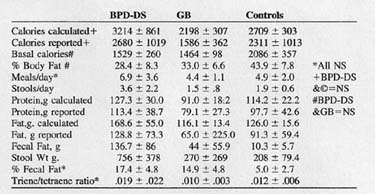Fat Malabsorption
A study by Gagner et al. demonstrating 81% fat malabsorption following Duodenal Switch weight loss surgery.
Decreased lipid malabsorption in both gastric bypass and biliopancreatic diversion with duodenal switch.
Gagner et al. 2005
PII: S1550-7289(05)00173-5
PURPOSE: Bariatric surgical procedures for weight loss are hypothesized to produce weight loss both by restricting food intake and selectively producing malabsorption of fats.
METHODS: In an attempt to quantitate fat and protein intake and caloric losses, we measured protein and fat intake and stool fat losses in 9 patients with a body mass index (BMI) 27.8 kg/m2, _1 year after gastric bypass who were weight stable, 10 patients with a BMI of 26.5 kg/m2 who were weight stable _1yr after biliopancreatic diversion with duodenal switch (BPD-DS), and 8 obese volunteers with a BMI of 41.2 kg/m2. Fasting lipid and fatty acid profiles were evaluated for fatty acid deficiency. Body composition was measured using bioelectric impedance.
RESULTS:

CONCLUSIONS: All triene/tetraene ratios were _0.4, indicating no fatty acid deficiency. Those who underwent BDP-DS ate more calories (p _0.004), more fat (p _0.01), and more protein (p_0.004) compared with those who underwent gastric bypass. They did not eat more frequently (p _0.10) or excrete a greater percentage of fat (p _0.29). They did excrete more fat (p _0.02) and had larger (p _0.007) and more frequent (p _0.015) stools.